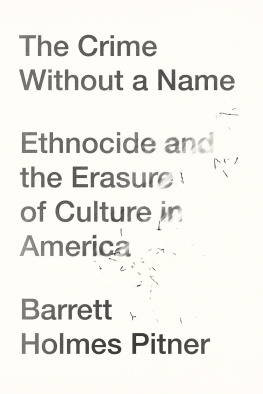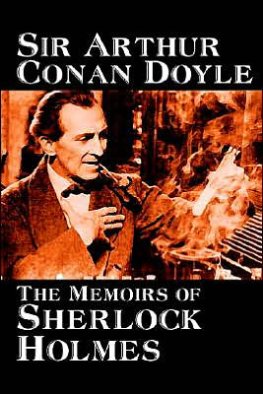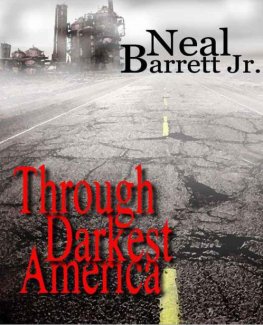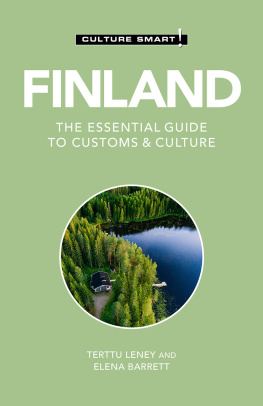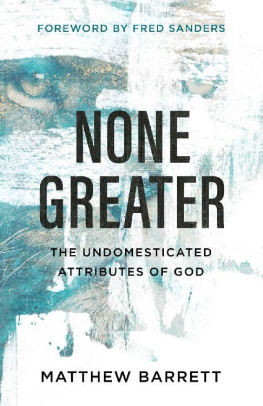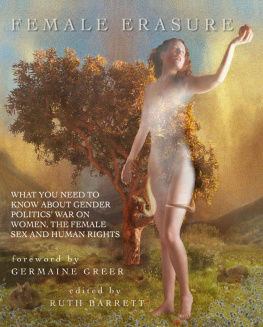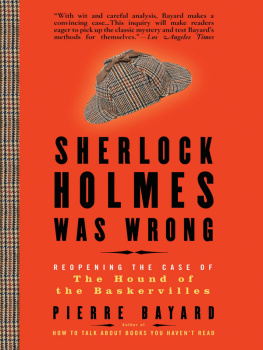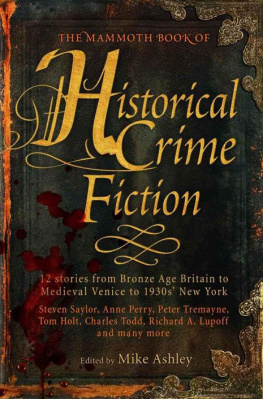Barrett Holmes Pitner - The crime without a name : Ethnocide and the erasure of culture in America
Here you can read online Barrett Holmes Pitner - The crime without a name : Ethnocide and the erasure of culture in America full text of the book (entire story) in english for free. Download pdf and epub, get meaning, cover and reviews about this ebook. year: 2021, genre: Politics. Description of the work, (preface) as well as reviews are available. Best literature library LitArk.com created for fans of good reading and offers a wide selection of genres:
Romance novel
Science fiction
Adventure
Detective
Science
History
Home and family
Prose
Art
Politics
Computer
Non-fiction
Religion
Business
Children
Humor
Choose a favorite category and find really read worthwhile books. Enjoy immersion in the world of imagination, feel the emotions of the characters or learn something new for yourself, make an fascinating discovery.
- Book:The crime without a name : Ethnocide and the erasure of culture in America
- Author:
- Genre:
- Year:2021
- Rating:5 / 5
- Favourites:Add to favourites
- Your mark:
- 100
- 1
- 2
- 3
- 4
- 5
The crime without a name : Ethnocide and the erasure of culture in America: summary, description and annotation
We offer to read an annotation, description, summary or preface (depends on what the author of the book "The crime without a name : Ethnocide and the erasure of culture in America" wrote himself). If you haven't found the necessary information about the book — write in the comments, we will try to find it.
The crime without a name : Ethnocide and the erasure of culture in America — read online for free the complete book (whole text) full work
Below is the text of the book, divided by pages. System saving the place of the last page read, allows you to conveniently read the book "The crime without a name : Ethnocide and the erasure of culture in America" online for free, without having to search again every time where you left off. Put a bookmark, and you can go to the page where you finished reading at any time.
Font size:
Interval:
Bookmark:


To Andrea and our son
Thus the task is not so much to see what no one yet has seen, but to think what nobody yet has thought about that which everybody sees.
ARTHUR SCHOPENHAUER
American society lacks the language to describe itself, and as a result it is incapable of diagnosing and rectifying its own destruction. The severity of Americas linguistic void became unmistakable during the presidency of Donald Trump as his vulgar existence crippled the nation, and we struggled to precisely articulate the severity of the problem. Our discourse that focused on morality, emotion, religion, bipartisanship, economics, and race repeatedly proved inadequate for describing the monster before us. And while Trump highlighted the problem, he was not its source. America lacks this language because our problem derives from our culture. Our destructive culture created an inadequate language, and so America empowers dangerously flawed people like Trump. To change this dynamic, we need new language.
Much of my work that led to the creation of The Sustainable Culture Lab seeks to address this need, to bring languagenew and lesser-knowninto common parlance so we may define ourselves and create a more equitable society. America is built upon ethnocidethe destruction of a peoples culture while keeping the peoplebut this word is both new and uncommon. Ethnocide, along with its more famous sibling, genocide, was coined in 1944 by Raphael Lemkin, a Polish Jewish refugee to the United States. Its original purpose was to describe the atrocities committed against the Jewish people by the Nazis during the Holocaust. The creation of the words ethnocide and genocide filled a linguistic vacuum by describing a form of violence that was previously unimaginable. To persuade Europeans to stop destroying themselves and to ensure that humanity could learn and improve, the continents greatest thinkers developed new philosophies and words to describe their horrible actions. However, since 1944 the term ethnocide has lived in relative obscurity, and only now is it being used to describe the transatlantic slave trade.
The absence of language is a beguiling problem, especially since English, being a merging of Romance and Germanic languages, has an abundance of words. American English suffers from an absence of meaningfuland yet a profusion of meaninglesslanguage due to our systemic ethnocidal divisions.
The inadequacy of our language even extends to how we describe ourselves as a society. Linguistically, we are encouraged to casually interchange America and United States as our collective identifier. However, the latter speaks to the name of a government and the former to a European-based concept of existence that is built upon the linguistic erasure of Indigenous culture. It is also the namesake of a man who never set foot on the land that became the United States of America. These words do not have the same meaning, but we are encouraged to act as if they do. In a language built upon domination and destruction, the meanings of wordsand lifebecome afterthoughts because dominance precedes everything else. Most Americans probably understand America to be a de facto cultural identifier, but a seed of doubt still exists because we are unsure of what exactly constitutes American culture. Since this book is an exploration of language and culture, I use America to express our culture, which has existed since before the creation of the United States.
Also, the confusion that occurs from the word we in American English speaks to this absence or inadequacy. As a Black man, when I use we most people infer that I am speaking about the Black community, my common people, and not about a we that refers to a collective American people. This is because our society has never aspired to have a common people; if you share commonality you are less likely to create an other whose culture you can destroy and exploit. The centuries-long ethnocide of the transatlantic slave trade consisted of European colonizers forcefully bringing Africans to the Americas so that they could destroy African culture, exploit African bodies, and build a society upon perpetual division and the absence of a collective we. The United States racial divisions of Black and white were created to sustain and normalize ethnocidal division. When Americans say we we struggle to understand the denotation of the word, and we are unaccustomed to non-white Americans having the agency to represent and define our collective society. America is a muted society with a plethora of words.
Scarcity within linguistic abundance seems contradictory, but this is our reality. We have an excess of words for nearly everything except our own identity and culture. We can define ourselves as a democracy and a nation that celebrates freedom and liberty, yet this language and narrative lose their legitimacy in the face of American legacies like slavery and Jim Crow. Democracies are imperfect by design, with systems of exclusion and marginalization baked into even the best of them, but the faith in democracy resides in the systems philosophical commitment and capacity to rectify these inequalities. American democracy does not work this way. Our reliance on ethnocidal division has created a society dependent on sustaining inequality, which we mask with the faade of democracy.
Freedom has Germanic roots and liberty has French roots, and these are two English words that mean the same thing and yet mean nothing when applied to the American experience. When the American ideals of democracy, freedom, and liberty are juxtaposed against the American practices of chattel slavery or Indigenous genocide, we confront a hypocrisy and an absence of words because we do not have the language for our unique American hypocrisy. The concept of ethnocide provides the beginning of the necessary language.
Rarely do we confront the insufficiency of our own language. Instead, we prefer to imagine a society devoid of our systemic tyranny, and in so doing we can attach ourselves to inaccurate, yet clearly preferable identifiers such as democracy, freedom, and liberty. As a Black man I have never been able to accept this status quo because my culture stems from Americas systemic tyranny. American hegemony relies on the deliberate and strategic silencing of voicesincluding mineand there are many methods for making one mute in America. Ones voice can be forcefully silenced, or one can be bribed into embracing ones oppression. Yet once one can express their voice, their words must do more than describe the oppression and hypocrisy that befalls their community, because Americas corrupted, oppressive, and hypocritical language will work to silence their liberating discourse or turn it into meaningless gibberish. For our liberating words to have meaning in America, they must speak to the collective we that America has never wanted to exist.
This book is equal parts memoir and philosophical journey because recognizing the absence of language encompasses both the journey to find ones own voice and the process of finding the language for ones voice to convey its intended meaning and create sustainable change. Despite how outspoken I was growing up, I struggled to find the language to describe my environment in the American South.
I grew up in the suburbs of Atlanta, Georgia, and I had a bunch of white friends growing up. It was normal for one of my friends to casually describe me as white like us. Every time I heard this I would recoil. Sometimes Id brush it off, other times I would remind them that Im not white, and theyd respond by insisting, You know what I mean. But now the question is
Font size:
Interval:
Bookmark:
Similar books «The crime without a name : Ethnocide and the erasure of culture in America»
Look at similar books to The crime without a name : Ethnocide and the erasure of culture in America. We have selected literature similar in name and meaning in the hope of providing readers with more options to find new, interesting, not yet read works.
Discussion, reviews of the book The crime without a name : Ethnocide and the erasure of culture in America and just readers' own opinions. Leave your comments, write what you think about the work, its meaning or the main characters. Specify what exactly you liked and what you didn't like, and why you think so.

